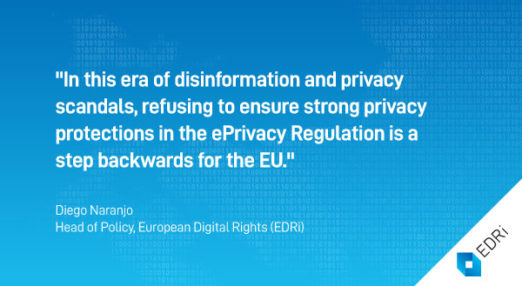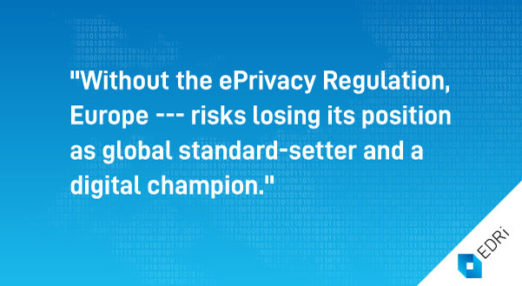Privacy and confidentiality
Privacy is a crucial element of our personal security, enabling free speech and democratic participation. The absolute and fundamental human right to privacy guarantees people respect for their private life and freedom from snooping and unlawful interference. It gives everyone the freedom to be themselves, to express and develop their opinions and ideas with dignity, and to practice their religion, as well as giving journalists and civil society the ability to report on violations of rights by states or businesses. Without sufficient privacy, people’s private interactions are exposed, which can be used to target or discriminate against them.
Filter resources
-

ePrivacy: EU Member States push crucial reform on privacy norms close to a dead end
Today, on 22 November 2019, the Permanent Representatives Committee of the Council of the European Union (COREPER) has rejected the Council’s position on a draft ePrivacy Regulation. “In this era of disinformation and privacy scandals, refusing to ensure strong privacy protections in the ePrivacy Regulation is a step backwards for the EU,” said Diego Naranjo, […]
Read more
-

Dance. Enjoy. Share. With Care.
Anyone using cloud services should be aware of what the “cloud” is, what it is not, and how it can affect our privacy and security. Our information stored in “clouds” can be protected if the EU says “Yes!” to a strong ePrivacy Regulation, greater enforcement of the General Data Protection Regulation (GDPR), and drops the […]
Read more
-

ePrivacy hangs in the balance, but it’s not over yet…
Unless you have been living under a rock (read: outside the “Brussels bubble”) you will likely be aware of the long and winding road on which the proposed ePrivacy Regulation has been for the last three years. This is not unusual for a piece of European Union (EU) legislation – the 2018 General Data Protection […]
Read more
-

Greece: The new data protection law raises concerns
On 29 August 2019, the much awaited new Greek data protection law came into force. Τhis law (4624/2019), implements both the provisions of the EU Law Enforcement Directive (LED, 2016/680) and the General Data Protection Regulation (GDPR) into national level. However, since the first days after the law was adopted, a lot of criticism was […]
Read more
-

Danish data retention: Back to normal after major crisis
The Danish police and the Ministry of Justice consider access to electronic communications data to be a crucial tool for investigation and prosecution of criminal offences. Legal requirements for blanket data retention, which originally transposed the EU Data Retention Directive, are still in place in Denmark, despite the judgments from the Court of Justice of […]
Read more
-

Austrian Passenger Name Records complaint – the key points
Austrian EDRi member epicenter.works filed a complaint with the Austrian data protection authority (DPA) about the Passenger Name Records (PNR) in August 2019, with the aim to overturn the EU PNR Directive. On 6 September, the DPA rejected the complaint, which was a good news, because that was the only way to lodge a complaint […]
Read more
-

The sixth attempt to introduce mandatory SIM registration in Romania
A tragic failure by the police to save a teenage girl who was abducted but managed to call the 112 emergency number three times before she was murdered, led to the adoption of a new Emergency Ordinance in Romania. The law introduces several measures to improve the 112 system, one of which is mandatory SIM card registration for all prepaid users. Currently approximately ten million prepaid SIM cards are used in Romania.
Read more
-

#PrivacyCamp20: Technology and Activism
The 8th annual Privacy Camp will take place in Brussels on 21 January 2020. With the focus on “Technology and Activism”, Privacy Camp 2020 will explore the significant role digital technology plays in activism, enabling people to bypass traditional power structures and fostering new forms of civil disobedience, but also enhancing the surveillance power of […]
Read more
-

Open letter to EU Member States: Deliver ePrivacy now!
On 11 October 2019, EDRi, together with four other civil society organisations, sent an open letter to EU Member States, to urge to conclude the negotiations on the ePrivacy Regulation. The letter highlights the urgent need for a strong ePrivacy Regulation in order to tackle the problems created by the commercial surveillance business models, and […]
Read more
-

Why weak encryption is everybody’s problem
Representatives of the UK Home Department, US Attorney General, US Homeland Security and Australian Home Affairs have joined forces to issue an open letter to Mark Zuckerberg. In their letter of 4 October, they urge Facebook to halt plans for end-to-end (aka strong) encryption across Facebook’s messaging platforms, unless such plans include “a means for […]
Read more
-

Right a wrong: ePrivacy now!
When the European Commission proposed to replace the outdated and improperly enforced 2002 ePrivacy Directive with a new ePrivacy Regulation in January 2017, it marked a cautiously hopeful moment for digital rights advocates across Europe. With the backdrop of the General Data Protection Regulation (GDPR), adopted in May 2018, Europe took a giant leap ahead […]
Read more
-

CJEU on cookies: ‘Consent or be tracked’ is not an option
European Digital Rights (EDRi) welcomes the CJEU's confirmation that under the current data protection framework, cookies can only be set if users have given consent that is valid under the General Data Protection Regulation (GDPR).
Read more
